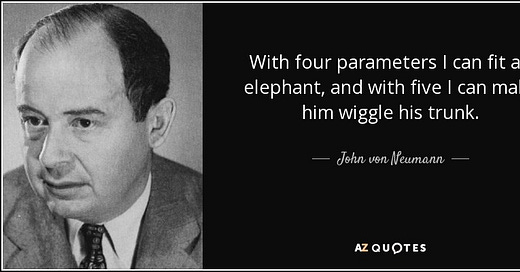The 500-lb Von Neumann's Elephant in the Room
A Critical Look at the Limitations of Complex Models in Predicting Our Planet's Climate Future
John von Neumann (1903–1957) was a Hungarian-American mathematician, physicist, computer scientist, and polymath who made ground-breaking contributions to various fields including mathematics, physics, economics, and computer science. He is considered one of the most brilliant and influential scientists of the 20th century.
Von Neumann's contributions to mathematics include the development of functional analysis, the foundation of quantum mechanics through his mathematical formulation, and significant work in set theory and topology. In computer science, he was pivotal in developing the digital computer architecture concept, now known as the von Neumann architecture. This architecture is a central design component of almost all modern computers.
In addition to his work in mathematics and computer science, von Neumann made significant contributions to game theory, a field of economics that studies mathematical models of strategic interaction among rational decision-makers. He is considered one of the founding figures of game theory, having co-authored "Theory of Games and Economic Behavior" with Oskar Morgenstern, one of the foundational texts in the field.
During his research in computer science Von Neumann coined a famous quote…
The quote humorously and effectively captures a critical insight into the nature of mathematical modeling, statistical fitting, and the potential for errors in the context of complex data analysis.
Von Neumann's Elephant is a thought experiment highlighting the dangers of overfitting complex models to limited data. It reminds us that while complex models can sometimes fit observations closely, this doesn't guarantee they accurately represent reality.
A model with a sufficient number of adjustable parameters, such as a climate model, can be made to fit a wide range of data sets, even those that do not have any meaningful relationship to the underlying phenomena the model is supposed to represent. This is a demonstration of the model's flexibility but also a warning against overfitting.
Overfitting occurs when a model is tailored so closely to a particular set of data that it captures the random noise in the data as if it were a significant pattern. Such a model is unlikely to perform well on new, unseen data because it is too specific to the peculiarities of the original dataset.
The quote also hints at the problem between a model's ability to describe past or existing data and its capacity to predict future or unseen data. Just because a model can describe complex data very well (fit an elephant) doesn't mean it has genuine predictive power or a deeper understanding (predict how the elephant will move next).
In the context of climate models, overfitting could lead to overly complex models, incorporating too many variables or processes without adequate justification from empirical data. This complexity can make the models sensitive to the specific datasets they were developed with, potentially compromising their ability to accurately predict future climate conditions under different scenarios. The introduction of unknowns such as uncertain rates of ice melt or carbon absorption by different land covers, adds layers of complexity and uncertainty. As models become more sophisticated, the spread of predictions can increase, highlighting the hidden uncertainties within these complex simulations.
Von Neumann's elephant serves as a cautionary tale about the limits of our ability to simulate complex systems accurately. Climate systems are incredibly complex, involving interactions among the sun, atmosphere, oceans, land surface, ice, and living organisms. Each of these components has its complex dynamics and interacts with the others in intricate ways. Climate models strive to simulate these processes to predict future climate conditions, but they must simplify many aspects of the real climate system to make the problem tractable.
A great example of climate models failing to track observations was a recent paper…
Keep reading with a 7-day free trial
Subscribe to Irrational Fear to keep reading this post and get 7 days of free access to the full post archives.




